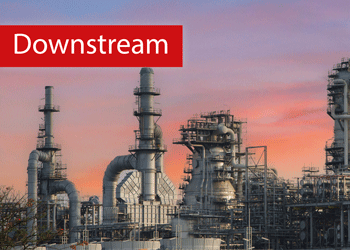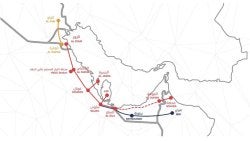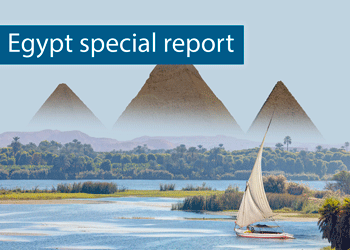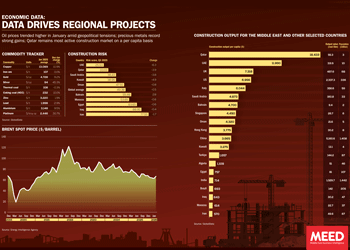Traffic drives construction underground
3 April 2025

On 14 February, Dubai construction was thrust again onto the global stage when Elon Musk, the world’s richest man, announced plans to explore the development of an underground Dubai Loop transportation system, along the lines of the Las Vegas Convention Centre Loop project in the US.
Dubai has typically made headlines globally by constructing the world’s tallest towers. As the city becomes increasingly congested on the surface, it is taking some of its largest construction projects underground.
With Musk’s backing, the Dubai Loop scheme is the most high-profile tunnelling project launched to date. It involves carving a futuristic transport system underneath Dubai. The initial phase of the project is currently being studied by Dubai’s Roads & Transport Authority (RTA) in partnership with The Boring Company, which is owned by Musk. It will cover 17 kilometres (km) and have 11 stations, with the capacity to transport over 20,000 passengers an hour.
The project highlights the importance of expanding underground infrastructure in the Middle East region. This is mostly necessitated by the pressure that rapidly growing cities have put on existing transport and utility networks, particularly in major urban centres such as Dubai, Riyadh and Doha.
 Underground opportunities
Underground opportunities
Projects that involve tunnelling, such as metro rail systems, underground highways and pedestrian walkways, are deemed key enablers in reducing congestion and optimising land use.
The recently completed metro systems in Riyadh and Doha are examples of how underground rail networks can facilitate efficient urban mobility, and more such schemes are planned.
Without these subterranean projects, cities risk being stuck in a permanent state of gridlock, with longer commute times and decreased productivity. At the same time, tunnelling allows urban planners to integrate sustainable transport solutions, as well as large-scale utilities networks, without disturbing existing cityscapes, thereby enhancing connectivity and economic growth.
These developments signal a major shift in engineering priorities, with regional governments investing in underground transport, sewerage and metro extensions to accommodate their growing populations and infrastructure needs.
While the tower crane-dotted skylines of urban centres in the GCC attract attention, delivering major projects underground is an equally impressive engineering feat. Tunnelling under busy cities requires advanced excavation techniques, careful planning and coordination to avoid disruptions.
More tunnelling work is expected as Dubai takes another significant step forward in tackling its ongoing traffic problems [with] a new metro link
UAE tunnelling projects
Tunnelling work forms a significant portion of the Dubai Metro Blue Line extension. Awarded in December for AED20.5bn ($5.5bn), the project includes 15.5km of underground track and five subterranean stations. When operational in 2029, the Blue Line will significantly expand Dubai’s metro capacity, linking major residential and commercial hubs.
More tunnelling work is expected as Dubai takes another significant step forward in tackling its ongoing traffic problems by starting the procurement process for its next metro link: the Gold Line.
Although the technical details of the project have yet to be revealed, it is expected that tunnels will form a major component of the scheme given that the new line will run through busy urban areas where there is little space to build overground.
The Gold Line will start at Al-Ghubaiba in Bur Dubai. It will run parallel to – and alleviate pressure on – the existing Red Line, before heading inland to Business Bay, Meydan, Global Village and residential developments in Dubailand.
As a first step, the RTA has sent a request for proposals to companies for the lead consultancy role on the multibillion-dollar project.
The UAE’s Etihad Rail also began a study of the tunnels required for the high-speed railway line connecting Abu Dhabi and Dubai in January. The survey works are ongoing on the Jaddaf and Dusup tunnels that will serve the high-speed rail link. Initial plans for the project include tunnelling works totalling 31km.
Another major tunnelling project in the UAE is the $22bn Dubai Strategic Sewerage Tunnels scheme. The client, Dubai Municipality, is preparing to tender its first packages, which include deep tunnels that will stretch 42km in Jebel Ali and 16km in Warsan.
The project will be delivered under a public-private partnership model, with international consortiums competing for contracts. Once completed, these tunnels will replace the traditional wastewater network, reducing energy consumption and enhancing long-term sustainability.
Saudi schemes
In Saudi Arabia, Riyadh is preparing to expand its metro network with the addition of a Line 7 and an extension to the existing Line 2.
The total length of Line 7 will be about 65km, of which 47km will be underground. The line will have 19 stations, 14 of which will be underground.
The project involves constructing a metro line linking the Qiddiya entertainment city development, King Abdullah International Gardens, King Salman Park, Misk City and Diriyah Gate.
In March, the Royal Commission for Riyadh City (RCRC) gave consortiums until 15 June to submit their bids for a design-and-build contract for the construction of Line 7.
The planned Line 2 extension is 8.4km long, of which 7.1km is underground, and three out of its five stations will be built underground. The RCRC is expected to award the construction contract this year.
In January, the kingdom also completed the phased roll-out of the Riyadh Metro network. The current network comprises six lines spanning about 176km, of which 74km is constructed underground.
These numbers indicate that over 42% of the overall network is underground, highlighting the growing importance of tunnels in the kingdom’s plans to improve infrastructure in its most densely populated cities.
Tunnelling works are also a key component of the plans to improve the stormwater drainage system in Jeddah, where the municipality is preparing for the construction of the King Abdullah Road-Falasteen Road tunnel.
The three-year scheme involves constructing 5.3km of tunnels with an internal diameter of 7.2 metres using tunnel boring machines (TBMs) and another 3.4km of tunnels with a diameter of 3.5 metres driven by pipe jacking or TBMs.
At the kingdom’s Neom gigaproject, city planners are looking to find solutions to many of the problems faced in existing cities and, as a result, tunnels and large-scale underground utilities corridors are being built at the beginning of the project. For example, the development’s Delta Junction tunnels will serve as a railway junction connecting the Spine infrastructure corridor with the Neom Connector rail link to the Oxagon industrial zone.
The project involves 26.5km of tunnelling work that will be split into a north and a south lot. The construction works are expected to begin this year as the client is evaluating the revised proposals submitted by firms in November last year.
Kuwait Metro will feature extensive tunnelling … ensuring minimal disruption to existing roads while integrating with future transport networks
Further tunnel projects
Beyond the Gulf, Egypt has a long history of tunnelling projects, as it has had to deal with crippling congestion and urban overcrowding for decades. In the 1980s, work was completed on two major projects that involved tunnelling: the first phase of the Cairo Metro system and the Greater Cairo wastewater project, which involved the construction of sewage tunnels on the east and west banks of the Nile.
Today, Cairo’s tunnelling projects include the Cairo Metro Line 4 project. Spanning 42km with 39 stations, it involves over 20km of tunnels.
Meanwhile, in Morocco, national railway operator L’Office National des Chemins de Fer (ONCF) is constructing a tunnel project in Rabat.
In February, ONCF announced a 3.3km tunnel to be constructed under the Bou Regreg river at an estimated cost of MD1.4bn ($140m). The tunnel will connect the Sale and Agdal stations in an effort to alleviate traffic.
Similarly, the long-awaited Kuwait Metro will feature extensive tunnelling to navigate the dense urban fabric of Kuwait City, ensuring minimal disruption to existing roads while integrating with future transport networks.
Qatar’s expansion of Doha Metro, meanwhile, requires additional underground infrastructure to connect developing areas and support the country’s vision for a comprehensive public transport system.
Mecca Metro, already serving millions of pilgrims, is also set for further expansion, likely involving significant tunnelling to facilitate smoother access to holy sites while overcoming geographic constraints.
In Oman, the Muscat Metro project is likewise expected to link key districts while preserving the city’s landscape and avoiding disruptions to arterial roads by introducing underground sections.
All of these projects show that tunnels will play an important role in the region’s future as it strives to create cities with more efficient and environmentally sustainable transit and utilities systems.
Exclusive from Meed
-
 Chemicals producers look to cut spending
Chemicals producers look to cut spending27 February 2026
-
 Qatar takes a quantum leap in fulfilling LNG ambitions
Qatar takes a quantum leap in fulfilling LNG ambitions26 February 2026
-
 Contractor appointed for UAE-Saudi power grid interconnection
Contractor appointed for UAE-Saudi power grid interconnection26 February 2026
-
 Egypt’s crisis mode gives way to cautious revival
Egypt’s crisis mode gives way to cautious revival26 February 2026
-
 February 2026: Data drives regional projects
February 2026: Data drives regional projects26 February 2026
All of this is only 1% of what MEED.com has to offer
Subscribe now and unlock all the 153,671 articles on MEED.com
- All the latest news, data, and market intelligence across MENA at your fingerprints
- First-hand updates and inside information on projects, clients and competitors that matter to you
- 20 years' archive of information, data, and news for you to access at your convenience
- Strategize to succeed and minimise risks with timely analysis of current and future market trends

Related Articles
-
 Chemicals producers look to cut spending
Chemicals producers look to cut spending27 February 2026

Following significant capital expenditure (capex) on petrochemicals and specialty chemicals projects in the first half of this decade, chemicals producers in the Middle East and North Africa (Mena) region are expected to reduce spending in 2026 – and perhaps beyond.
Two primary factors are understood to be behind this anticipated drop. With the bulk of their projects under execution and on course to enter operations between now and the end of the decade, both state-owned and private chemicals producers appear to be set to achieve their short- to mid-term capacity expansion goals.
Also, with subdued global petrochemicals and chemicals demand putting sales margins under pressure, regional players are looking to rein in spending in order to remain profitable.
Steady spending
 An estimated $71bn-worth of petrochemicals and specialty chemicals projects are in the engineering, procurement and construction (EPC) stage in the Mena region, with main contracts for the majority of these projects having been awarded in 2020-25, according to data from regional project tracker MEED Projects.
An estimated $71bn-worth of petrochemicals and specialty chemicals projects are in the engineering, procurement and construction (EPC) stage in the Mena region, with main contracts for the majority of these projects having been awarded in 2020-25, according to data from regional project tracker MEED Projects.The biggest chemicals project under EPC execution is the $11bn Amiral project in Saudi Arabia, which represents the expansion of Saudi Aramco Total Refining & Petrochemical Company (Satorp) in the petrochemicals sector.
Satorp, in which Saudi Aramco and France’s TotalEnergies hold 62.5% and 37.5% stakes, respectively, operates a crude refinery complex in Jubail that has the capacity to process 465,000 barrels a day (b/d) of Aramco’s Arabian Heavy crude oil grade to produce refined products such as diesel, jet fuel, gasoline, liquefied petroleum gas, benzene, paraxylene, propylene, coke and sulphur.
Integrated with the existing Satorp refinery in Jubail, the Amiral petrochemicals complex will house one of the largest mixed-load steam crackers in the Gulf, with the capacity to produce 1.65 million tonnes a year (t/y) of ethylene and other industrial gases.
This expansion is expected to attract more than $4bn in additional investment in industrial sectors including carbon fibres, lubricants, drilling fluids, detergents, food additives, automotive parts and tyres.
Another large-scale project under execution is the Al-Faw integrated refinery and petrochemicals project in Iraq. State-owned Southern Refineries Company brought on board China National Chemical Engineering Company in May 2024 to develop the estimated $8bn project.
The Al-Faw project is being implemented in two stages. The first phase involves developing a refinery with a capacity of 300,000 b/d and will produce oil derivatives for both domestic and international markets. The second phase relates to building a petrochemicals complex with a capacity of 3 million t/y.
EPC works are also progressing on the estimated $6bn Ras Laffan petrochemicals complex in Qatar, which will have the largest ethane cracker in the Middle East. The project is being developed by a joint venture (JV) of QatarEnergy and US-based Chevron Phillips Chemical (CPChem). QatarEnergy owns a majority 70% stake in the JV while CPChem holds the remaining 30%.
The Ras Laffan petrochemicals complex is expected to begin production this year. It consists of an ethane cracker with a capacity of 2.1 million t/y of ethylene. This will raise Qatar’s ethylene production potential by nearly 70%.
The complex includes two polyethylene trains with a combined output of 1.68 million t/y of high-density polyethylene polymer products, raising Qatar’s overall petrochemicals production capacity by 82% to almost 14 million t/y.
A JV of South Korean contractor Samsung Engineering and CTCI of Taiwan was awarded the EPC contract for the ethylene plant, which is understood to be valued at $3.5bn. The EPC contract for the polyethylene plant was awarded to Italian contractor Maire Tecnimont, which said the value of its contract was $1.3bn.
Decisive period
More than $61bn-worth of petrochemicals and specialty chemicals projects are in pre-execution stages in the Mena region, according to MEED Projects, although contracts for less than a quarter of these schemes are set to be awarded in 2026.
 The largest capex programme in the regional chemicals sector that is expected to make progress this year is Saudi Arabia’s liquids-to-chemicals programme, the aim of which is to attain a conversion rate of 4 million b/d of Aramco’s crude oil production into high-value chemicals.
The largest capex programme in the regional chemicals sector that is expected to make progress this year is Saudi Arabia’s liquids-to-chemicals programme, the aim of which is to attain a conversion rate of 4 million b/d of Aramco’s crude oil production into high-value chemicals.Aramco has divided its liquids-to-chemicals programme into four main projects. The company has signed JV investment agreements with foreign partners this year for the four projects, which involve:
> Converting the Saudi Aramco Jubail Refinery Company (Sasref) complex in Jubail into an integrated refinery and petrochemicals complex with the addition of a mixed-feed cracker. The project also involves building an ethane cracker that will draw feedstock from the Sasref refinery. Front-end engineering and design (feed) work on the project is under way and is being performed by Samsung E&A.
> Converting the Yanbu Aramco Sinopec Refining Company (Yasref) complex into an integrated refinery and petrochemicals complex with the addition of a mixed-feed cracker. China’s Sinopec is a JV partner in this project.
> Converting the Saudi Aramco Mobil Refinery Company (Samref) complex in Yanbu into an integrated refinery and petrochemicals complex with the addition of a mixed-feed cracker. US oil and gas producer ExxonMobil, Aramco and Samref signed a JV framework agreement in December to begin preliminary feed work on the project.
> Building a crude oil-to-chemicals complex in Ras Al-Khair in the kingdom’s Eastern Province. Progress on this project has been slow.
Separately, Aramco subsidiary Saudi Basic Industries Corporation (Sabic) is in advanced negotiations with bidders for a project to build an integrated blue ammonia and urea manufacturing complex at the existing facility of its affiliate, Sabic Agri-Nutrients Company, in Jubail.
The estimated $2bn-$3bn project is known as the low-carbon hydrogen (LCH) San VI complex. The project is part of Sabic’s Horizon 1 LCH programme.
The planned San VI complex will have an output capacity of 1.2 million metric tonnes a year of blue ammonia and 1.1 million metric tonnes a year of urea and specialised agri-nutrients.

Qatari project
QatarEnergy, meanwhile, is pressing ahead with a project to expand its low-carbon ammonia and urea potential by building a production complex in Qatar’s Mesaieed Industrial City. The planned facility will have a total output capacity of 6.4 million t/y and is understood to be the eighth expansion phase of QatarEnergy’s fertiliser production complex in Mesaieed.
QatarEnergy issued the main EPC tender for the blue ammonia and urea production facility expansion project last July and set a deadline of 15 April for contractors to submit bids. The state energy enterprise is expected to award the main contracts for the project by the end of this year.
https://image.digitalinsightresearch.in/uploads/NewsArticle/15797039/main.gif -
 Qatar takes a quantum leap in fulfilling LNG ambitions
Qatar takes a quantum leap in fulfilling LNG ambitions26 February 2026
 Commentary
Commentary
Indrajit Sen
Oil & gas editorThe pace at which QatarEnergy has progressed from the front-end engineering and design (feed) stage to the engineering, procurement and construction (EPC) stage of its North Field West liquefied natural gas (LNG) project is impressive.
The state energy company awarded the main EPC contract for North Field West – covering two LNG processing trains with a total capacity of 16 million tonnes a year (t/y) – to a joint venture comprising France’s Technip Energies, Greece/Lebanon-based Consolidated Contractors Company (CCC) and Gulf Asia Contracting (GAC) on 25 February.
The EPC contract, estimated to be worth $8bn, was awarded just one month after QatarEnergy granted the project’s feed contract to Japan-based Chiyoda Corporation.
Such a short interval between the feed and EPC phases for a project as large as North Field West LNG would typically be considered improbable. Industry sources suggest QatarEnergy may have been in discussions with Chiyoda and the Technip Energies–CCC consortium for at least a year regarding the feed and EPC contracts, respectively – particularly given the two-year gap between the project’s announcement in February 2024 and the start of the EPC phase.
Chiyoda, Technip Energies and CCC are also involved in the first two phases of QatarEnergy’s $40bn North Field LNG expansion project. A consortium of Chiyoda and Technip Energies is executing EPC works on the North Field East project, which involves the construction of four LNG trains with a combined capacity of 32 million t/y, following the award of a $13bn contract in February 2021. Meanwhile, a Technip Energies–CCC consortium is carrying out EPC works on two 7.8 million t/y LNG trains as part of the North Field South project, having secured a $10bn contract in May 2023.
More significant, however, is the speed with which QatarEnergy is advancing its strategic objective of reaching a total LNG production capacity of 142 million t/y by the end of the decade.
With all three phases of the North Field LNG expansion programme now under EPC execution – and North Field East scheduled for commissioning later this year – QatarEnergy appears firmly on track to become one of the world’s largest LNG suppliers over the long term, reinforcing Qatar’s economic future in the process.
https://image.digitalinsightresearch.in/uploads/NewsArticle/15781900/main.jpg -
 Contractor appointed for UAE-Saudi power grid interconnection
Contractor appointed for UAE-Saudi power grid interconnection26 February 2026

The GCC Interconnection Authority (GCCIA) has awarded a contract to Omexom, part of France's Vinci Group, for a 400kV overhead transmission line between the UAE and Saudi Arabia.
The $230m project involves the construction of a 96-kilometre, double-circuit 400kV overhead line linking the Al-Silaa substation in Abu Dhabi with the Salwa substation in Saudi Arabia.
The project also includes expanding three key substations in Gonan, Al-Silaa and Salwa and installing upgraded 400kV switchgear, circuit breakers and reactors.
As MEED previously reported, the project is being financed by the Abu Dhabi Fund for Development (ADFD), which signed a $205m financing agreement with GCCIA last July.
France’s EDF is acting as the main consultant on the project.
The award marks Omexom’s first major contract in the region.
The interconnection is intended to strengthen power grid connectivity between the UAE and Saudi Arabia.
It forms part of wider GCC grid expansion plans, including the $700m Oman power grid interconnection, which began implementation earlier this month.
This project marks one of the largest expansions in the authority’s history and involves building a 400kV double-circuit transmission line extending about 530km between the two countries.
https://image.digitalinsightresearch.in/uploads/NewsArticle/15781729/main.jpg -
 Egypt’s crisis mode gives way to cautious revival
Egypt’s crisis mode gives way to cautious revival26 February 2026
 Commentary
Commentary
John Bambridge
Analysis editorIn the past three years, Egypt has faced pressures that would test any market, with collapsed staple revenues, currency volatility and escalating debt pushing it to the fiscal brink. Yet if 2023 and 2024 were years of crisis management, 2025 was a year of economic policy and geopolitical realignment.
Egypt’s foreign policy has always been rooted in pragmatism, but mounting economic fragility has sharpened that instinct. In 2022, Cairo faced just one geopolitical fracas on its borders: Libya. Since 2023 – amid the emergence of conflicts in Sudan and Israel-Palestine – the Egyptian government has become the unwilling inheritor of instability along all three of its land borders. This has eaten into regional trade and Egypt’s stake in it.
In response, Cairo has retrenched around a few simple principles: insulating the domestic economy from geopolitical shocks, preserving internal stability, and leveraging Egypt’s strategic location and role in the region’s security architecture to pursue a more transactional foreign policy. This is inseparable from Egypt’s quest to restore macroeconomic credibility after successive devaluations and inflationary pressure. External actors, meanwhile, see Egypt as too vital a regional lynchpin to fail; US-based funds and Gulf governments have moved quickly to help stabilise Cairo’s finances.
Looking ahead, Egypt’s stated ambition is to move back towards a more routine, predictable monetary policy framework by 2027, with an inflation target of 7% by Q4 2026. This is as much about signalling as substance, but so far investors appear to be buying it. The oil and gas sector is showing renewed momentum, supported by upstream incentives and improved payment discipline towards international operators. Utility infrastructure contracts, meanwhile, reached a decade-high $5bn in 2025, dominated by renewable energy schemes. The water sector is also full of potential, with projects worth about $4.5bn at the prequalification or bid stage.
Beyond energy and utilities, coastal real estate is re-emerging as a hotspot, driven by huge new masterplans across the Mediterranean and Red Sea, supported by public and private entities in the UAE, Saudi Arabia and Qatar. These foreign-backed schemes offer a welcome counterweight to the slowdown in domestically financed projects and are a boon for a construction market that has otherwise cooled.
Egypt remains highly fiscally vulnerable. However, if Cairo can maintain disciplined economic management and continue to use foreign policy pragmatism to secure investment and financial support from its neighbours and the international community, it may yet convert today’s fiscal strain into the foundation for a genuinely investable future.

MEED’s March 2026 report on Egypt includes:
> GOVERNMENT: Egypt adapts its foreign policy approach
> ECONOMY & BANKING: Egypt nears return to economic stability
> OIL & GAS: Egypt’s oil and gas sector shows bright spots
> POWER & WATER: Egypt utility contracts hit $5bn decade peak
> CONSTRUCTION: Coastal destinations are a boon to Egyptian constructionTo see previous issues of MEED Business Review, please click herehttps://image.digitalinsightresearch.in/uploads/NewsArticle/15717634/main.gif -
 February 2026: Data drives regional projects
February 2026: Data drives regional projects26 February 2026
Click here to download the PDF
Includes: Commodity tracker | Construction risk | Brent Spot Price | Construction output
MEED’s March 2026 report on Egypt includes:
> COMMENT: Crisis gives way to cautious revival
> GOVERNMENT: Egypt adapts its foreign policy approach
> ECONOMY & BANKING: Egypt nears return to economic stability
> OIL & GAS: Egypt’s oil and gas sector shows bright spots
> POWER & WATER: Egypt utility contracts hit $5bn decade peak
> CONSTRUCTION: Coastal destinations are a boon to Egyptian constructionTo see previous issues of MEED Business Review, please click herehttps://image.digitalinsightresearch.in/uploads/NewsArticle/15781010/main.gif


